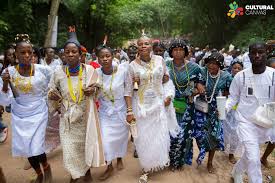The Eyo Festival is a traditional Nigerian masquerade celebrated primarily in Lagos State, showcasing the rich cultural heritage of the Yoruba people.
The Eyo Festival originated in the 19th century as a ritual to honor deceased Obas (kings) and notable figures. It’s believed to have evolved from burial ceremonies, specifically Oba Akintoye’s funeral procession in 1854.
The festival is held annually, but the exact date varies. It’s often staged to commemorate significant events, such as
the death of an Oba or eminent Lagosian, the enthronement of a new Oba and visits by state or foreign dignitaries.
The duration of the festival isn’t strictly defined, but it typically involves several days of celebrations, processions, and cultural displays.
The Eyo Festival holds deep cultural and historical significance, reflecting the Yoruba people’s reverence for their ancestors and tradition.
It Honors the memory of departed kings and notable figures.
Showcases the rich cultural heritage of the Yoruba people.
Fosters community identity and unity and Preserves and promotes Yoruba traditions
The festival plays several roles in Lagos society which includes:
Cultural Preservation:Enhances awareness and appreciation of Yoruba traditions.
Community Engagement:Encourages participation across different demographics.
Economic Boost: Increases local commerce during the festival period
Symbolism: The Eyo masquerades embody the history and social life of the Yoruba people, conveying messages from ancestors and reinforcing communal ties
Key Aspects of”Eyo” festival:
Processions: Grand parades showcasing vibrant costumes, music, and dance.
Masquerades: Eyo masquerades are revered figures believed to convey messages from ancestors.
Cultural Displays: Traditional arts, music, and dance reflecting the rich heritage of the Yoruba people.
Spiritual Significance: Eyo is seen as a messenger to the realm of the dead, carrying prayers and requests from the living to ancestors.






The things i have usually told men and women is that when looking for a good online electronics shop, there are a few aspects that you have to factor in. First and foremost, you would like to make sure to get a reputable as well as reliable shop that has gotten great critiques and rankings from other shoppers and business world analysts. This will make sure that you are getting through with a well-known store that gives good support and assistance to their patrons. Thanks for sharing your ideas on this site.
If you want to increase your experience just keep visiting this site and be updated with the most up-to-date news update posted here.
Have you ever considered about including a little bit more than just your articles? I mean, what you say is fundamental and all. However imagine if you added some great images or video clips to give your posts more, “pop”! Your content is excellent but with images and clips, http://www.hairstylesvip.com this website could undeniably be one of the best in its field.